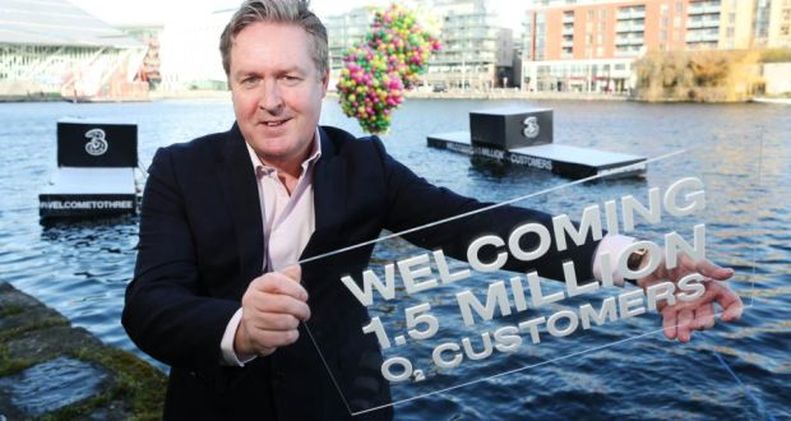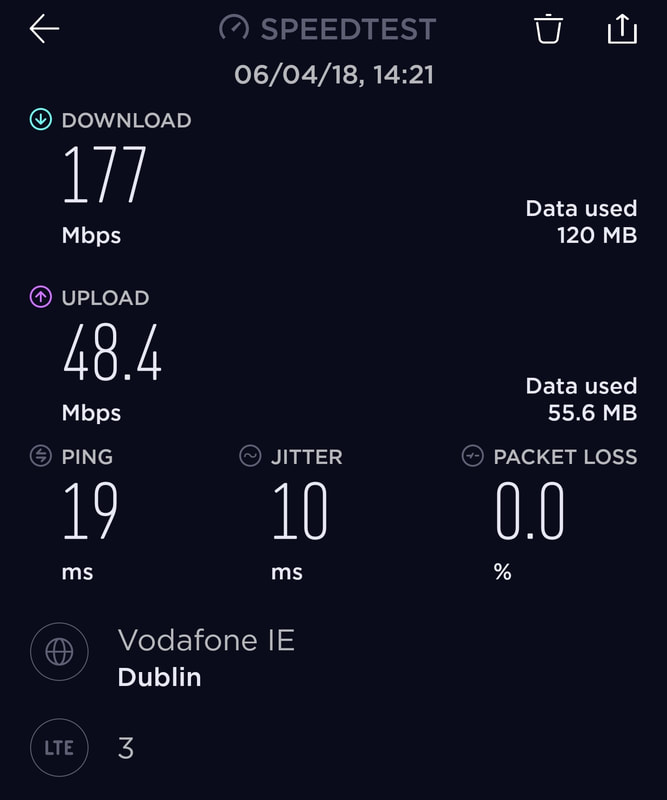Three just stormed past Eir
After years of providing a lacklustre service to its customers, the company has finally emerged from the shadows.
Published 21/06/18
It's hard to believe it, but Three's actually got a good network in Ireland now. A network vastly improved upon from the one it operated just two years ago. It really does mark a major change for the company. No more crippling download speeds or vast swathes of land left untouched by any form of signal.
Combining two completely separate networks couldn't have been easy. Three knows that for sure. But its the final product that really matters in the end, and that final product is just over the horizon. Sure, its still behind Vodafone, but the gap is shrinking every day. Add in the fact that Three customers consume significantly more data than their Vodafone and Eir counterparts, and it's clear that Three is building a network with the capacity to carry a mammoth amount of data.
This transformation wasn't cheap either, Three invested €350 million in 'The Big Upgrade' programme. Admittedly, the programme was slow at first and certainly not as fast as anyone would like. The upgrade programme involves a complete overhaul of Three's network, from the antennas that beam signal to our phones, to the backhaul network and data centres. I'm told its 'one of the most complex upgrade operations ever undertaken by a mobile network'. I can't verify if that statement is true, but I can say that Three just stormed past Eir.
According to OpenSignal and based on my own experience, Three now has Ireland's second fastest network, pushing Eir to third. For Eir, that's not so nice. This was coming for a while now. As I've explained before, Eir's network has been inundated with data usage it wasn't built to carry ever since it began zero rating services such as YouTube. Ookla's data shows Eir's 4G speeds have dived from 25.19Mbps in 2015 to 16.70Mbps in 2017. That's a dramatic drop, one which could have only gotten worse over the past number of months.
I've noticed that drop very clearly. Testing an Eir SIM recently, I frequently had to turn off 4G and switch to 3G to watch videos on YouTube because of constant buffering. To put this into perspective, I was receiving over 60Mbps on Vodafone and 15Mbps on Three in the exact same place. With Eir, it was 0.14Mbps. It will be interesting to see the results of Ookla's Speedtest awards at the end of this year, you can be sure that Three's average speeds will have skyrocketed.
There's some who may argue that it is too late. That its ridiculous Three is only now providing an acceptable service to its customers. I know so many people who have flocked from Three, and would never look back. It has tainted the reputation of the company, a company previously applauded for its efforts to breath fresh life into a stale industry.
Combining two completely separate networks couldn't have been easy. Three knows that for sure. But its the final product that really matters in the end, and that final product is just over the horizon. Sure, its still behind Vodafone, but the gap is shrinking every day. Add in the fact that Three customers consume significantly more data than their Vodafone and Eir counterparts, and it's clear that Three is building a network with the capacity to carry a mammoth amount of data.
This transformation wasn't cheap either, Three invested €350 million in 'The Big Upgrade' programme. Admittedly, the programme was slow at first and certainly not as fast as anyone would like. The upgrade programme involves a complete overhaul of Three's network, from the antennas that beam signal to our phones, to the backhaul network and data centres. I'm told its 'one of the most complex upgrade operations ever undertaken by a mobile network'. I can't verify if that statement is true, but I can say that Three just stormed past Eir.
According to OpenSignal and based on my own experience, Three now has Ireland's second fastest network, pushing Eir to third. For Eir, that's not so nice. This was coming for a while now. As I've explained before, Eir's network has been inundated with data usage it wasn't built to carry ever since it began zero rating services such as YouTube. Ookla's data shows Eir's 4G speeds have dived from 25.19Mbps in 2015 to 16.70Mbps in 2017. That's a dramatic drop, one which could have only gotten worse over the past number of months.
I've noticed that drop very clearly. Testing an Eir SIM recently, I frequently had to turn off 4G and switch to 3G to watch videos on YouTube because of constant buffering. To put this into perspective, I was receiving over 60Mbps on Vodafone and 15Mbps on Three in the exact same place. With Eir, it was 0.14Mbps. It will be interesting to see the results of Ookla's Speedtest awards at the end of this year, you can be sure that Three's average speeds will have skyrocketed.
There's some who may argue that it is too late. That its ridiculous Three is only now providing an acceptable service to its customers. I know so many people who have flocked from Three, and would never look back. It has tainted the reputation of the company, a company previously applauded for its efforts to breath fresh life into a stale industry.
4G Coverage: Getting There...
Three's network has always struggled with coverage. I'm thrilled to say that issue has been solved, mostly. Vodafone is ahead here, with over 96% 4G population coverage. Eir is at 95% and Three is breaching 94%. Those numbers seem close, but its geographic coverage that really matters. Eir will be passed by Three very soon in terms of geographic 4G coverage. It will be quite some time until they catch up with Vodafone, but it will happen, hopefully.
Three has almost twice as many customers as Eir does. For Three, that means more revenue. Based on the latest statistics from ComReg's Quarterly Key Data Report, Three earns more revenue per customer than Eir. Everyone knows that Vodafone is the most profitable here, people are willing to pay for quality.
Three has pledged to invest €100 million a year to roll out its 5G network. That's a significant sum of money. I see Three pushing the prospect of 5G broadband in the future, its the only mobile network that doesn't control an extensive fibre network. Securing 100MHz nationally in ComReg's 3.6GHz 5G auction puts the network in a good position to roll out a very capable 5G network. Now that most of the technical standards surrounding 5G have been specified, I expect trials to intensify.
Three has almost twice as many customers as Eir does. For Three, that means more revenue. Based on the latest statistics from ComReg's Quarterly Key Data Report, Three earns more revenue per customer than Eir. Everyone knows that Vodafone is the most profitable here, people are willing to pay for quality.
Three has pledged to invest €100 million a year to roll out its 5G network. That's a significant sum of money. I see Three pushing the prospect of 5G broadband in the future, its the only mobile network that doesn't control an extensive fibre network. Securing 100MHz nationally in ComReg's 3.6GHz 5G auction puts the network in a good position to roll out a very capable 5G network. Now that most of the technical standards surrounding 5G have been specified, I expect trials to intensify.
The Path to 5G: Expanding 4G+
In short, Three's 4G+ network is growing rapidly. It's significantly larger than Eir's 4G+ network and relatively close to Vodafone's own 4G+ network, which was the first in Ireland. As we come closer to the launch of 5G, the evolution of 4G will become crucial. Unfortunately, rolling out 5G will be a slow and long process. To achieve speeds measured in gigabits per second, high-frequency spectrum must be utilised. This spectrum offers incredibly high capacity by today's standards but doesn't travel very far. A ubiquitous 5G network in Ireland would cost billions, and it's not going to happen any time soon.
Three and Vodafone recognise this. 4G is going to be here a while, it won't disappear. 4G+ is the logical bridging point between 4G and 5G. It offers high capacity and travels much further than what high-frequency 5G will. Expect 4G+ to be the fallback network in many areas. Three has around 900 sites live with 4G+ and plans to roll the technology out to all of its towers when 'The Big Upgrade' is completed. The network boasts theoretical maximum speeds of 400Mbps, thanks to a combination of 256 QAM and three carrier aggregation.
I've been lucky enough to make use of these speeds on a Samsung Galaxy S8 in multiple locations in the south-east. An example can be seen below.
Three and Vodafone recognise this. 4G is going to be here a while, it won't disappear. 4G+ is the logical bridging point between 4G and 5G. It offers high capacity and travels much further than what high-frequency 5G will. Expect 4G+ to be the fallback network in many areas. Three has around 900 sites live with 4G+ and plans to roll the technology out to all of its towers when 'The Big Upgrade' is completed. The network boasts theoretical maximum speeds of 400Mbps, thanks to a combination of 256 QAM and three carrier aggregation.
I've been lucky enough to make use of these speeds on a Samsung Galaxy S8 in multiple locations in the south-east. An example can be seen below.
A Paradigm Shift
It was not so long ago that I bashed Three for the quality of its network, which at the time, was a compliment to even call a network. Fortunately, those days are over. I still have some gripes with the network, don't get me wrong. There's still a complete absence of any form of 4G and 3G in many areas near where I live. Those coverage issues should be resolved in the coming months, finally.
Eir needs to do something. Ever since it was acquired by Xavier Niel, the company has been like a statue that's slowly being weathered. It is the smallest mobile network in Ireland, good coverage and speeds are fundamental in adding to and maintaining its customer base. Crucially, Eir needs to aggressively roll out a 4G+ network similar to that of Vodafone and Three.
It's the dawn of a new day for Three. If it continues to rapidly roll out 4G and increase capacity, its rocky past will be a distant memory. I look forward to the day when I can recommend someone to choose Three as their mobile network because of its network quality, not just because of its offers.
Eir needs to do something. Ever since it was acquired by Xavier Niel, the company has been like a statue that's slowly being weathered. It is the smallest mobile network in Ireland, good coverage and speeds are fundamental in adding to and maintaining its customer base. Crucially, Eir needs to aggressively roll out a 4G+ network similar to that of Vodafone and Three.
It's the dawn of a new day for Three. If it continues to rapidly roll out 4G and increase capacity, its rocky past will be a distant memory. I look forward to the day when I can recommend someone to choose Three as their mobile network because of its network quality, not just because of its offers.



